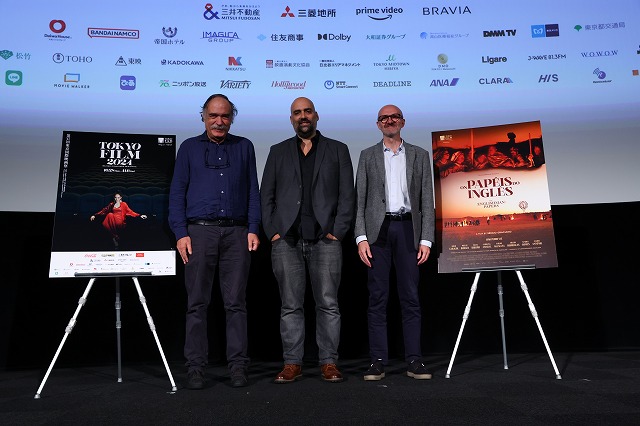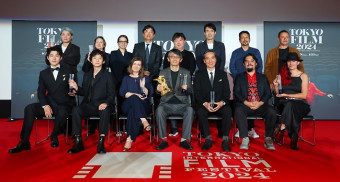
For the audience who attended the world premiere of the Portuguese film The Englishman’s Papers, which screened in the Competition section of the 37th Tokyo International Film Festival on October 29, the poet Ruy Duarte de Carvalho is probably not a household name. But during the post-screening Q&A session, the three members of the filmmaking team who accompanied the movie to Japan made it clear that “Duarte” is more than just a prominent literary figure in Portugal; he is something like a god.
“He was one of our greatest writers,” said the producer, Paulo Branco. “But he was also a cinematographer and in the 70s made fiction films and documentaries. Most of his life he spent in the deserts of Angola and Namibia. In his writing, he talked about the history of Angola in a very dramatic way.”
The film, which jumps around in time so as to provide a portrait of Angola both during and since its Portuguese colonial period, mostly centers on Duarte’s search for the titular manuscript in the desert of Namibia, where his father wandered as an ethnographer and had misplaced them. The documents supposedly hold the solution to a historical mystery that obsessed Duarte. In tracking down this diary, written by an English hunter, he encounters various individuals who elaborate on the region and its people, including natives, Europeans, and even Brazilian immigrants, through the medium of their own life stories.
As such, the desert itself becomes as much of a dramatic player as the characters themselves. “When you go to the desert, you don’t really see the desert,” said actor João Pedro Vaz, who plays Duarte in the film. “But the desert sees you.”
While Duarte was born in Portugal, he moved to Angola as a child and eventually came to regard it as his home. With this acceptance came all the emotions one associates with home. Consequently, The Englishman’s Papers transcends the notion of nostalgia for a bygone era and looks at the history of Angola with a sharp, clear vision, recognizing the inherent privilege of the colonialists, even among those, like Duarte, who have utter respect for the native culture.
As Branco explained, when Angola achieved independence in 1975, some 700,000 Portuguese left the country and yet retained an ineffable connection to it. The results were complicated. Late in the movie, when Duarte joins the entourage of a white man who was born in Angola but lived most of his life in Portugal, the contrasts and similarities between the two men’s sensibilities are startling and revelatory, driving them to the brink of violence against each other.
The director, Sérgio Graciano embodies this paradox, since he has lived in Angola for many years. “I wanted to shoot the film from an Angolan’s perspective, with emotion and heart,” he said after TIFF Programming Director Ichiyama Shozo asked about what drew him to the project. “I lived in the capital, Luanda, but this is about the south of Angola, which is desert. And to me, it’s all about the desert, which is more than a landscape.”
In adapting Duarte’s writings, Graciano and his scriptwriter, José Eduardo Agualusa, took the factual stories from the first book of Duarte’s trilogy about Angola and then added fictional elements to make an integrated film. “It’s important when talking about the experience of Duarte to know that it existed outside of the long history of Angola,” said Branco. “The natives still live in their natural way and keep their customs, and this is what always fascinated Duarte.” Thus, there are many scenes of interactions between Europeans and natives that may be puzzling to the viewer because Duarte himself didn’t deign to interpret what natives feel and think.
When a viewer asked about the difficulties of shooting in such a location, the director answered, “We had to do what the desert wanted us to do, and sometimes it didn’t cooperate.” Vaz added that Duarte’s writings are so vivid that they prepare you for the desert, which he found amazing. “He approached the desert as a poet, a farmer, a filmmaker, and in the end as an anthropologist.”
To Graciano, the project was a dream come true. “I have many dreams,” he said, “and one of them was to shoot a film in the desert. Another was to come to Japan, so at least two of them have come true.”
Q&A Session: Competition
The Englishman’s Papers
Guests: Sérgio Graciano (Director), Paulo Branco (Producer), João Pedro Vaz (Actor)


























































